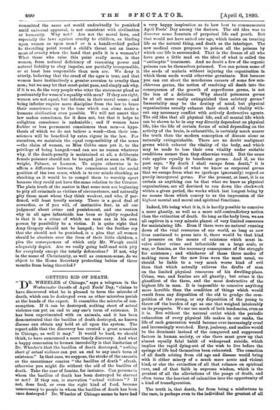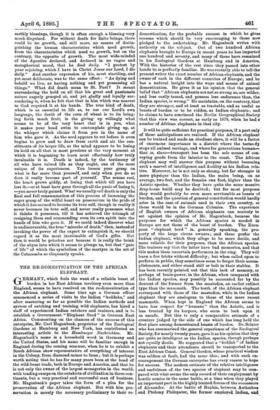GETTING RID OF DEATH.
" IrLyt. WHEELER of Chicago," says a telegram in the Westminster Gazette of April Fools' Day, "claims to have discovered what he is pleased to term the microbe of death, which can be destroyed even as other microbes perish at the hands of the expert. It resembles the microbe of con- sumption. If it can be destroyed, nothing short of actual violence can put an end to any one's term of existence. It has been experimented with on animals, and it has been demonstrated that the bacillus of death destroyed, no known disease can obtain any hold at all upon the system. The report adds that the discovery has created a great sensation in Chicago, as well it may." It would be bard, we should think, to have announced a more timely discovery. And what a happy concession to human incredulity is that limitation of Dr. Wheeler's that the bacillus of death destroyed, "nothing short of actual violence can put an end to any one's term of existence." In that case, we suppose, the stroke of the assassin or the executioner creates "the bacillus of death" afresh, otherwise you might die without the aid of the bacillus of death. Take the case of famine, for instance. Can persons in whom the bacillus of death has been destroyed be starved or not ? If they can, is starvation "actual violence "P If not, does food, or even the right kind of food, become unnecessary to people in whom the bacillus of death has been once destroyed ? Dr. Wheeler of Chicago seems to have had
a very happy inspiration as to how best to commemorate Apt il Fools' Day among the doctors. The old idea was to discover some fountain of perpetual life and youth. But that would not have suited our age, which insists on treating life as the natural thing, and death as the interloper. The new medical craze proposes to poison all the poisons by which our life is surrounded. That is the dream of all who have gone a little mad on the ideal of what is called the " antiseptic " treatment. And no doubt a few of the organic poisons can be themselves poisoned. You can poison some of the seeds of malaria without injuring the organisation in which these seeds would otherwise germinate. But because you can cut short the murderous careers of some few mis- chievous germs, the notion of resolving all death into the consequence of the growth of superfluous germs, is not the less of a delirium. Why should poisonous germs be at all more easily extinguished than salutary germs ? Immortality may be the destiny of mind, but physical organisations usually exhaust their stock of vitality with- out any necessary conflict with actively destructive agents. The old idea that all physical life, and all mental life which can be shown to be in any way directly dependent on physical life, like the life of certain forms of mind depending on the activity of the brain, is exhaustible, is certainly much nearer the truth than the modern conception of disease alone as naturally extinguishable. There are no doubt malignant germs which exhaust the vitality of the body, and which may be made to lose their own vitality under suitable conditions sooner than they otherwise would. But the same rule applies equally to beneficent germs. And if, as the poet says, "By death I shall escape from death," it is only by the death of what we know as corporeal germs that we escape from what we (perhaps ignorantly) regard as purely incorporeal germs. For the present, at least, it is as certain as anything can be that what we know as physical organisations, are all destined to run down like clockwork within a given period, the works which last longest being by no means those which convey to us the impression of the highest mental and moral and spiritual functions.
Indeed, life being what it is, it is hardly possible to conceive a more ghastly, as well as a more self-contradictory notion than the extinction of death. So long as the body lives, we are all captives in a very minute planet of very limited resources for maintaining life. Even if there were no natural running down of the vital resources of our world, so long as new lives continued to press into it, there would be that kind of pressure on the means of existence which must in- volve either crime and infanticide on a large scale, or war, or famine, as the necessary consequence of the struggle for existence ; and whichever of those three modes of making room for the new lives were the most usual, we should be liable to a very much worse kind of evil than that which actually relieves the drafts of man on the limited physical resources of his dwelling-place. Crime, war, and famine are all ghastly ; but crime is the ghastliest of the three, and the most destructive of the highest life in man. It is impossible to conceive anything more horrible than the condition of things which would result from any disposition of the old to grudge the com- petition of the young, or any disposition of the young to throw off the burden of age as one that weighed intolerably on its prospects. We see too much of both tendencies, even as it is. But without the natural outlet which the periodic exhaustion of every physical life makes in our ranks, the life of each generation would become ever-increasingly cruel and increasingly wretched. Envy, jealousy, and malice would be the dominant instead of the conquered and suppressed factors in human society, or else there must grow up that almost equally fatal habit of widespread suicide, which implies the rapid dying-out of the wish to live before the springs of life had themselves been exhausted. The cessation of all death arising from old age and disease would bring with it either misery of a much more acute and violent kind, or else the extinction of all that reliance on spiritual care, and of that faith in supreme wisdom, which is the greatest of all the alleviations of the pangs of death, and often turns the heaviest of calamities into the opportunity of a kind of transfiguration.
The truth is, that death, far from being a misfortune to the race, is perhaps even to the individual the greatest of all
earthly blessings, though it is often enough a blessing very much disguised. For without death for finite beings, there could be no growth, and still more, no means of distin- guishing the human characteristics which need growth, from the characteristics which need no growth, but on the contrary, the opposite of growth. The most wide-minded of the Apostles declared, and declared in no vague and metaphorical mood, that he died daily. "I protest by your rejoicing, which I have in Christ Jesus our Lord, I die daily." And another expression of his, most startling, and yet most deliberate, was to the same effect : "As dying and behold we live, as having nothing and yet possessing all things." What did death mean to St. Paul ? It meant surrendering the hold on all that his great and passionate nature eagerly grasped at, and yet gladly and loyally sur- rendering it, when he felt that that in him which was nearest to God required it at his hands. The true kind of death, which is as essential to life as, to use our Lord's own language, the death of the corn of wheat is to its bring- ing forth much fruit, is the giving up willingly what seems to be of the very heart that is in you, what it makes your head swim to contemplate giving up, at the whisper which claims it from you in the name of him who gave it. As the seed appears to rot before it even begins to grow and to draw from earth and air the con- stituents of its larger life, so the mind appears to be losing its hold on all that is most precious at the very moment at which it is beginning to learn most effectually how truly invaluable it is Death is indeed, by the testimony of all who have valued life as they ought, one of the most unique of its experiences. You loosen your grasp on what is far more than yourself, and only when you do so does it really become part of yourself. The senses reel, the heart grows giddy, at losing that which till you have lost it,—or at least have gone through all the panic of losing it, —you never truly gained. What we usually call death is only the final and full consummation of this process of loosening the eager grasp of the wilful heart on possessions in the pride of which it has seemed to become its true self, though in reality it never becomes its true self, and never really possesses what it thinks it possesses, till it has achieved the triumph of resigning them and commending even its own spirit into the hands of him who gave it. If we could indeed discover what is undiscoverable, the true "microbe of death," then, instead of invoking the power of the expert to extinguish it, we should regard it as the most inestimable of God's gifts. But then it would be priceless not because it is really the brink of the abyss into which it seems to plunge us, but that "gate of life" of which the symbolism of the martyrs in the art of the Catacombs so eloquently speaks.







































 Previous page
Previous page